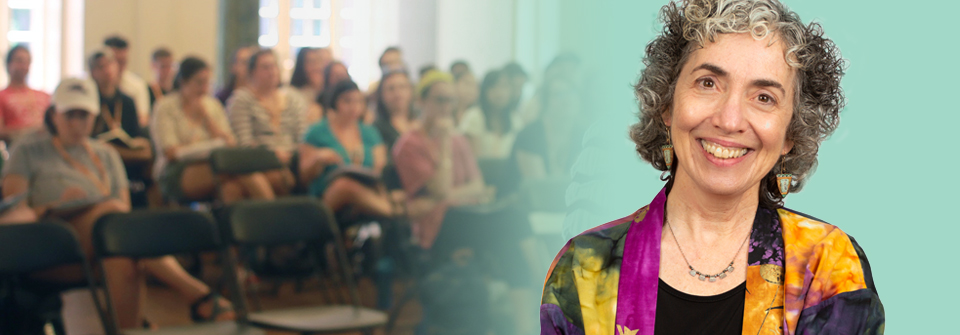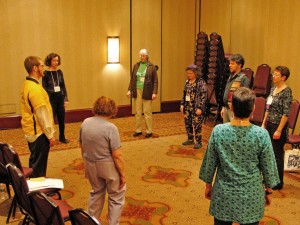
Workshops & Coaching
As a Trainer and Story Coach Cindy Rivka Marshall guides individuals to find, craft and tell their own stories or to learn to tell a traditional story in their own unique way. To set up a workshop to meet your needs or for story coaching, CONTACT Cindy
Creating a Culture of Appreciation – When facilitating story sharing, Cindy teaches groups how to give feedback to the tellers by offering appreciations – a response technique that encourages listeners to empathize and find the ways in which they resonate with the stories being told. She structures interactions with group guidelines for respect, and time management to ensure that everyone has a chance to speak and be heard.
Story Coaching – For anyone interested in telling their story expressively and with clarity of purpose, Cindy offers story coaching for individuals and small groups. To schedule, CONTACT Cindy
Current Offerings
Workshops for Diversity Awareness
Workshops for Organizations
Workshops for Educators
Workshops for Storytellers
Workshops for Parents and Grandparents
Workshops for Diversity Awareness
Giving Voice to All
This program’s goal is to highlight the voices of those who have not been heard. As an expert Story Coach, Cindy works one-one with an organization’s members to craft personal stories of marginalization. These stories are shared in meetings with facilitated appreciative listening that encourage connection and empathy. Cindy designs structures to build a safe environment of understanding human differences.
Using Stories to Explicitly Teach Empathy
Cindy presents a folktale and guides participants to tell this one story from many different points of view. Speaking in the first person voice of each character, then improvising a dialogue between the characters, participants will have insights into the many truths that may be present in any given story. Followed by discussion and practicing how to open up to dialogue across differences.
Workshops for Organizations
Professional Presentation Skills
Professionals in all fields: make your presentations more engaging by weaving in stories – this is what your listeners will remember. For those who work in Development, Outreach, or simply for internal staff having some crafted anecdotes in your pocket that you can pull out when needed can make all the difference. Cindy works with groups or individuals to identify suitable anecdotes. She coaches you to seamlessly integrate these stories into your talk.
Tell Your Compelling Story
Identify moments of your organization’s success that may be used in creating stories. Come away with tools to help you make conscious choices to best convey your message, and the beginning of a compelling story that conveys why your organization’s work is important.
Community Building and Team Building
Drawing upon her skills in theater and movement improvisation, interviewing and storytelling, her sessions are highly interactive, fun and creative. Cindy creates a safe space for personal story sharing and supportive listening. Many groups say that her workshops are transformative for the participants.
Ambassadors for Outreach
Involve everyone in being ambassadors for your organization, school or congregation. Give staff, members, or parents of students, the tools to tell anecdotes that vividly illustrate why they choose you! Those who believe in what you offer can spread the excitement and bring new people in the door by telling the story of what makes you unique.
Workshops for Educators
Jump off the Page
Put down the book and TELL the story to your students. You will reach your listeners even more effectively.
How do you move from reading a storybook to telling a story – without memorization or notes? How do you give a story depth and emotional resonance? Experiment with methods for learning a story and making it your own, with flexibility to respond to your listeners in the moment. Explore the use of voice and gestures to invite the participation of your listeners. Come away with a short story you can tell without a book, and a technique for how to do it on your own.
Interviewing and Oral History
Interviewing is an important skill for all learners and teachers. Cindy trains educators in a technique they can teach to their students, or works directly with students. As a former documentary filmmaker, Cindy teaches how to frame questions that will elicit stories. She demonstrates how to be an active listener, to ask follow up questions and be present to create a genuine connection with your interviewee.
Workshops for Jewish Educators
Read article in Creative Jewish Educators series
Stories of Our Jewish Journeys
This workshop for Jewish educators makes room for self-reflection that leads to a greater sense of purpose. How has Jewish tradition, community or identity intersected with your life journey or not? What has led you to doing this work? Learn techniques to begin crafting and telling stories of your Jewish journey. Sharing these stories with your colleagues, students, family and fellow congregants helps to build community.
Bringing Text to Life: Midrashic Storytelling
In midrashic storytelling, participants enter a biblical narrative and examine what questions the text leaves unanswered. They refer to written commentaries on this story, and then engage in a midrashic process of improvising dialogue between the characters in the story. Educators consider how to bring this approach into their teaching.
Inviting Miriam and Moses to the Seder Table
During the Passover seder, you can choose one or more scenes to act out, rather than reading from the Hagaddah. Ask others to assume roles in the story, and to speak as that character. The idea is to make the story come alive by using your imagination. Using all of your senses, imagine what it would be like to be one of the characters, to be a slave and then, to come out of Egypt. In this workshop, offered prior to Passover, participants will imagine and enact scenes from the Exodus story.
Workshops For Storytellers
Cindy uses guided visualization to explore sensory details and to develop a sense of place that will help the teller convey the immediacy of the moment. Physical and vocal exercises are another way to explore story material and to help tellers express characters and emotions.
Multidimensional Storytelling: A Look at Point of View
Led by a filmmaker-turned-storyteller, we will view some film footage to analyze how point-of-view is conveyed in film, and discuss how this translates to storytelling. We will apply some methodology of filmmaking to the art of storytelling, learning across mediums. Participants will then work with a folktale, exploring various points-of-view, and make choices about how to “frame” the action, and “who” will tell the story. The workshop will help participants to get a fuller picture of all of the different characters, and even the inanimate objects in the story. This allows the teller to more fully understand the dynamics of the scenes.
What a Character!
 Learn a method for creating clear, specific characters. We will loosen up body and voice to allow characters to come through gesture, walk, vocal patterns and facial expressions. Come work on a character from a story you already tell, or choose a new one on the spot. Walk away with a more fully developed character for your repertoire.
Learn a method for creating clear, specific characters. We will loosen up body and voice to allow characters to come through gesture, walk, vocal patterns and facial expressions. Come work on a character from a story you already tell, or choose a new one on the spot. Walk away with a more fully developed character for your repertoire.
Stories in Progress
Several storytellers together people one another’s stories. Play out a scene with people standing in to react and help you physically find how to embody a story moment.
Workshops for Parents and Grandparents
Tell Me a Story
Are your children or grandchildren hungry for stories? Are you tired of reading the same books over and over? Are you looking for some new ideas for how to initiate creative, story-based play with young children? This workshop will introduce story games, how to improvise with others, and techniques for how to take a written story and tell your own version. These tools will help you enjoy co-creating stories with the young children in your life.
Your Legacy Story
Your values such as generosity, kindness, or social action can be passed on to younger generations through storytelling. Use prompts to help you recall significant moments along your life’s journey, and from there you’ll develop anecdotes that you can tell others, which can form the basis of your longer story. In our group setting, we’ll take inspiration from each other as we bring out our stories and what’s most important to each of us.
